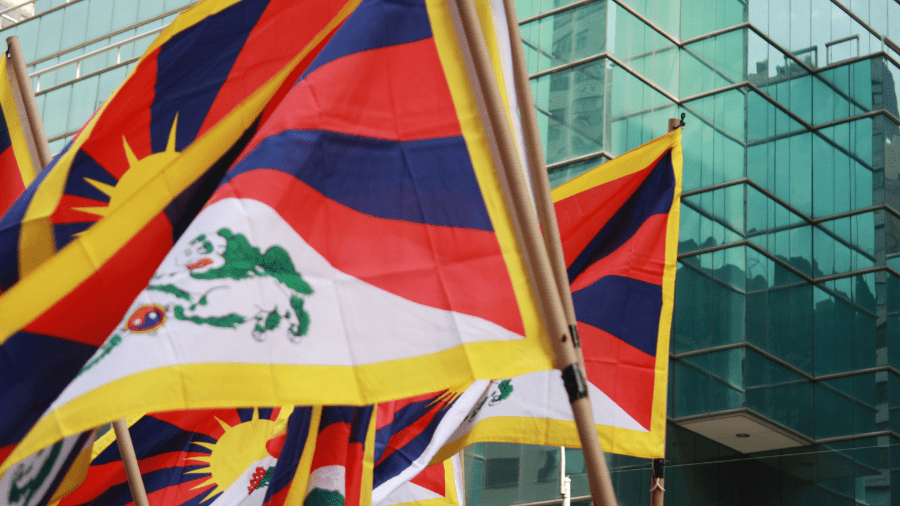By Sherap Therchin, March 10, 2023
Every year on March 10, Tibetans and supporters of the Tibetan cause around the globe unite to commemorate Tibetan National Uprising Day. This day is a solemn reminder of the thousands of Tibetans who lost their lives in March 1959 while protesting China’s occupation of Tibet. On the 64th anniversary of this event, Tibetans worldwide, including those in Canada, will hold rallies and peaceful demonstrations to promote awareness about China’s occupation of Tibet and seek international support to resolve the ongoing conflict.
For nearly a decade, public anger, fear, and frustration have been brewing in Tibet since Chinese military forces entered and forcibly occupied many areas. At dawn on March 10, 1959, the Tibetan public began streaming towards His Holiness the Dalai Lama’s residence after hearing news of China’s plan to abduct him through an invitation to a Chinese musical performance at the PLA military headquarters in Lhasa. As fear and suspicion turned into protests, over 30,000 Tibetans gathered to call for the Dalai Lama’s safety. More people joined the protests, and on March 11, representatives of the crowd unanimously demanded the formal declaration of Tibetan independence and the return of Chinese troops in Tibet to China.
Following these events, Chinese military forces launched a brutal crackdown on Tibetans in the region. Over the next few weeks, until March 28, heavy artillery shelling, bombing, and firing were used in all-out attacks on Tibetans, resulting in the deaths of thousands of innocent civilians, including many monks and nuns. After the brutal crackdown, China announced the dissolution of the Tibetan government that had been independently functioning for centuries.
Since then, the Chinese Communist Party has imposed complete control in Tibet through a series of systematic and sophisticated programs aimed at assimilating Tibetan people ideologically and culturally. This has involved a sustained effort for over six decades to eradicate Tibetan national identity, which is rooted in their unique language, culture, and religion.
The Chinese government’s attack on Tibetan Buddhism has been central to this campaign. To limit religious freedom, the government has taken various measures, such as destroying monastic institutes, removing monks and nuns, controlling monastic education curricula, and banning images of the Dalai Lama. The government has even claimed the right to identify the reincarnation of Tibetan Buddhist lamas, including the Dalai Lama himself.
A critical step began with the abduction of the Panchen Lama when he was only six years old. Post-abduction, the Chinese authorities appointed their own choice of monk as the Panchen Lama. In 2018, a group of People’s Republic of China’s (PRC) delegates, including some ethnic Tibetans, appeared before Canada’s foreign affairs committee, and responded to a query on the Panchen Lama’s whereabouts, stating that he is well and does not wish to be disturbed.
The Chinese government has also targeted Tibetan nomads by implementing a policy of mass rehousing and relocation. This policy has had a significant impact on the Tibetan people’s traditional way of life, without their input. Human rights organizations have criticized this policy for its adverse effects on the Tibetan people. In addition, in 2017, the Chinese authorities announced their plans to convert vast nomadic lands of Tibet into national parks, which could potentially lead to displacement and further restrictions on the Tibetan people’s land use and livelihoods.
More recently, China has established large-scale residential schools designed to assimilate Tibetans into the majority Han culture, erasing their cultural, religious, and linguistic identity. According to UN experts, approximately one million Tibetan children have been forced into residential schools across Tibetan areas.
Any Tibetans found resisting participation in such campaigns or expressing strong interest in preservation of their national identity become an easy target of arbitrary arrest and torture. According to numerous human rights reports and eyewitness accounts, the Chinese government has been arbitrarily arresting and torturing Tibetans for many years.
In one notable case, in 2015, Tashi Wangchuk, a Tibetan language activist, was arrested after he gave an interview to the New York Times, in which he discussed the Chinese government’s lack of support for the Tibetan language. He was charged with “inciting separatism” and was sentenced to five years in prison.
Similarly, in 2018, a Tibetan monk named Lobsang Jinpa was arrested and sentenced to 21 years in prison for allegedly sharing information about self-immolation protests in Tibet with a Tibetan living in India.
Tibetans who are arrested are often subjected to torture and ill-treatment in detention centres.
In some cases, the torture has led to the death of the detainee. Reports from various human rights organizations indicate that Chinese authorities often use methods such as beatings, electric shocks, and prolonged sleep deprivation. Detainees are also frequently denied access to legal counsel and are subjected to lengthy interrogations without any oversight.
The Chinese government’s attack on Tibetan Buddhism, targeting of Tibetan nomads, establishment of large-scale residential schools, and arbitrary arrests and torture of Tibetans have all contributed to the erasure of Tibetan national identity.
As Tibetans commemorate Tibetan National Uprising Day on March 10, it is important to remember and honour the Tibetan people’s struggles and to continue to advocate for their basic human rights and freedoms. The international community must continue to bring attention to these human rights violations and pressure the Chinese government to respect the rights of the Tibetan people.
Sherap Therchin is the Executive Director of Canada Tibet Committee.





